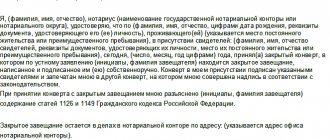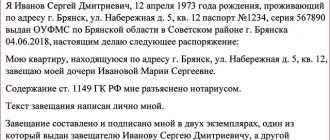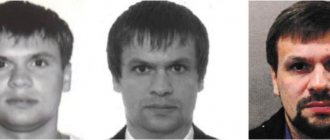How to find out if there was a will and where to look for it
The will has a strictly established written form and is subject to mandatory notarization. The document is drawn up in two copies : one remains with the notary, and the second is kept by the testator. Accordingly, the testator can transfer the document to his successors during his lifetime.
To receive property, citizens specified in the will must go through the procedure of entering into an inheritance, and then wait 6 months from the date of death of the testator. The opening of an inheritance case must take place at the notary's office in the place where the testator was registered or his property was located. To do this, the notary must provide the following package of documents:
- will;
- death certificate;
- identification documents;
Important
If it is not possible to provide a will in paper form , then it is necessary to draw up an application for entry into the inheritance, after which the notary himself will inform about the presence of the testator’s order.
A will can be drawn up by any notary , not necessarily at your place of residence. Therefore, when registering the right to inheritance, the notary makes a request through the Unified Information System for the availability of an order. Such information is provided only to relatives of the testator or citizens specified in the testator’s instructions.
If, after the opening of the inheritance, the heirs indicated in the will did not show up, then according to Art. 61 Federal Law No. 4462-1 of 02/11/1993, the notary is independently obliged to notify citizens about the opening of an inheritance. This rule is applicable only if the order indicates the place of residence or work of the legal successor. If such information is outdated or missing, then the notary can call the heirs by publicly notifying them through the media (for example, in a regional newspaper, magazine, radio, etc.).
How to find out if there is a will for inheritance during your lifetime
The testator can report the existence of an order solely of his own free will , since such a document is kept secret until the opening of the inheritance. According to Art. 1123 of the Civil Code of the Russian Federation, neither the notary nor other persons who were present at the certification of the will and have access to data about it have the right to disclose the information specified in the document, as well as the very fact of its existence . If this rule is violated, the testator has the right to demand compensation for corresponding losses.
If the testator does not want to report the will, then you can find out about its existence and contents only after the opening of the inheritance . Such a day is considered the day of death of a citizen indicated in the death certificate or court decision (if the citizen was previously declared missing).
Attention
Starting from June 1, 2021, the rules for drawing up a will have changed regarding the obligation to draw up the document alone. According to paragraph 4 of Art. 1118 of the Civil Code of the Russian Federation, the order can be drawn up jointly by married citizens. Consequently, the spouses will be able to have information about the existence of the order together.
If the terms of a will are disclosed by one of the spouses, the consequences of damages may also apply.
Why is it so important to find
A will legitimizes the will of the owner of property to transfer it into ownership to another person after the death of the testator. Most often, the document is drawn up with the help of a notary. Moreover, its publication is possible in two versions:
- Open, when a printed form is handed over to the testator or authorized person;
- Closed, if the document is kept by the notary who compiled it or his assistant.
Based on Art. 1154 of the Civil Code of the Russian Federation, the recipient of bequeathed property must declare his rights within six months from the date of death of the testator.
Article 1154. Time limit for accepting an inheritance
1. An inheritance can be accepted within six months from the date of opening of the inheritance.
If an inheritance is opened on the day of the expected death of a citizen (clause 1 of Article 1114), the inheritance can be accepted within six months from the date of entry into legal force of the court decision declaring him dead.
2. If the right of inheritance arises for other persons as a result of the heir’s refusal of the inheritance or the removal of the heir on the grounds established by Article 1117 of this Code, such persons may accept the inheritance within six months from the date on which their right of inheritance arises.
3. Persons for whom the right of inheritance arises only as a result of non-acceptance of the inheritance by another heir may accept the inheritance within three months from the date of expiration of the period specified in paragraph 1 of this article.
If the closest relatives decide to refuse to accept the inheritance, then the inheritance process is accelerated and is 3 months for the person in whose favor the refusal occurred.
If the heir indicated in the testator's last will did not know about his right, he may be left without the property that was rightfully due to him. If the will is discovered after the inheritance has been transferred to other hands, legal rights will have to be restored through the court.
If the property is sold by then, the litigation may last for many years and not bring the desired result. Finding the document is important specifically for the legal heir. For other interested parties, it becomes a significant obstacle in obtaining the desired inheritance.
How to find a will after the death of a relative
The first person to find out about the existence of a will is citizens who inherit according to the law in order of priority. The order is established depending on the closeness of relationship and starts from:
- children;
- spouses;
- parents.
To enter into inheritance rights, these citizens must contact a notary and provide documents confirming their family relationship (marriage certificate, birth certificate, court decision). After which the notary will have the right to announce the terms of the will.
If a will has been drawn up for an apartment or other real estate, then in order to accept such an inheritance, all documents must be accompanied by an extract from the Unified State Register of Real Estate , confirming the testator’s ownership of the property.
The law provides for the drawing up of a closed will ; even a notary cannot find out about its contents, and who is indicated as the recipient of the property. This order is announced in the presence of relatives who have the right to receive inheritance by law, after 15 days from the date of provision of the death certificate.
Distinctive features of the original will
The drawing up of a will is regulated by the norms of a unified legislative framework. The official form must be completed by the immediate testator with full capacity (which should be verified in advance). In case of physical health problems, this function is performed by a person authorized by law for the testator. Due to the mental incapacity of the testator, this fact must be verified and the will declared invalid.
The only distinguishing feature from a forgery is the official status of a document drawn up in the presence of a notary and certified by him. Subsequently, all information is entered by a notary legal entity into a single database or a single register. Further in this register you can check the will for existence. In appearance, such a copy will be represented by a color certificate with numbering.
Lack of notarization does not necessarily indicate fraudulent registration. It is not legally binding, so there is no need to check it. The heirs can draw up a single agreement on the division of the inherited property of a deceased citizen based on the opinion of the testator, expressed in a self-executed order (if there is no doubt about the reliability, which can be verified).
How to find out if the deceased left a will to a non-relative
Citizens have the right to bequeath their property to any person; the heirs do not necessarily have to be relatives.
If a citizen who is not one of the legal successors has reason to believe that property has been left in his name, then it is necessary to contact a notary at the place of residence of the testator and write an application for inheritance.
If a citizen is not one of the relatives and the inheritance case has not been opened , then he needs to search for the testator’s instructions. To do this, you can contact any notary and inform about the death of the testator. Since a death certificate can be issued by the registry office only to relatives , the notary independently makes a request to verify the death of the testator.
Information
If the information from the registry office is confirmed, then, at the request of the interested person, the notary checks through the Unified Information System whether a will has been drawn up in the name of the applicant. If there is an order, then the citizen has the right to inherit.
Stages of obtaining information about the will of a deceased person
If a close relative dies, the question always arises about the nuances of dividing the remaining valuables. If there is no information about the will, then you first need to find it. If it is impossible to find an order, then material benefits are transferred only to close relatives, who are determined on the basis of the requirements of the law.
If a citizen is sure that he should receive valuables after the death of a relative, then the following actions are performed:
- first you need to try to talk with close relatives or the spouse of the deceased;
- if the testator’s relatives refuse to make contact, then you need to find out the details of the notary working at the last place of residence of the deceased;
- You can find the information you need through free or paid electronic resources;
- if a citizen died in another country, you will have to contact representatives of the law of that state or use foreign databases;
- if a citizen died in a medical institution or nursing home, then it is advisable to contact the employees of this organization, since it is often there that an official order is formed.
Attention! To simplify the process of finding the necessary information, you can use the help of a lawyer.
You should only search if there is evidence of family ties. If the necessary papers are lost, they can be restored through the registry office or archive. If the estate contains real estate, then you must have documentation for this property.
Unified register of wills and inheritance cases
Any citizen can check whether the inheritance is currently open using the public Register of Inheritance Cases. To use this service, you must enter the full name of the testator, his birthday, and the date of death. The service will provide information about the address of the notary who is handling the inheritance case. After which the citizen will have to apply to the specified address with an application for inheritance.
On July 1, 2014, Law No. 379-FZ dated December 21, 2013 came into force, obliging notaries to enter information about all actions performed into the Unified Information System. If a will has been drawn up, the notary provides information about its certification and creates an electronic image of the document . Therefore, to search for an order, the heir has the right to contact any notary office, after which the inheritance case is opened at the place of residence of the testator.
A will may not be entered into the register , for example, because it was made a long time ago, since the law does not oblige the entry into the information system of orders drawn up before the law came into force. In this case, to search for a document, you must contact the notary chamber with a search request. It is best to do this at the last or previous place of residence of the testator or at the location of his real estate.
Check the will in the registry online
Interested parties do not have the right , since a unified information system was created in accordance with the requirements of the law on the secrecy of wills . Access to information regarding inheritance orders is available only to authorized persons who are obliged to maintain state secrets.
For your information
Only a notary has the right to search for wills at the time of opening the inheritance. After providing documents confirming the death of the testator, the notary must check the information about the existence of an inheritance order and become familiar with its contents no later than 2 business days , and then announce the information to the heirs.
Ways to search for inheritance
There is no single database that allows you to find out information about the property rights of the deceased. However, the heir can ask the notary to send requests to the following authorities:
- to obtain information about the testator’s real estate - to the federal cadastral service;
- You can find out about the availability of a car through the Interdistrict Department of the Traffic Police;
- data on existing business is provided to the Federal Tax Service.
Independently contacting these institutions will not bring the expected result, since such information is considered confidential.
By last name
There are several possibilities:
- https://notariat.ru/ru-ru/help/probate-cases/;
Search for a probate case online - personal visit to a notary’s office - these specialists have the opportunity to obtain the information of interest through the Unified Information System. But this is only available to relatives of the deceased citizen.
You can also seek help from commercial structures that specialize in providing inheritance tracing services.
Abroad
If a citizen owned property or business abroad, then the successors need to take into account the nuances of the legislation of that country. Especially if there was no will drawn up.
There are several ways to obtain information about foreign property. Basic:
- cooperation with companies providing similar services (preference should be given to Russian companies - it’s more convenient);
- ask for assistance from relatives, friends and acquaintances living in the territory of the state of interest.
Note: The second option will save money, but is considered riskier - not all people have the necessary knowledge to deal with such issues. In addition, such “helpers” may turn out to be dishonest.
In banks
Only a notary can clarify information about available deposits. For this purpose, official requests are sent to banks. However, the heir will be able to receive the funds only if there is a testamentary disposition.
Read also: Inheriting a car after the death of the owner
A testamentary disposition is drawn up by a bank depositor and is legally equivalent to a will (Article 1128 of the Civil Code of the Russian Federation).
Sample testamentary disposition
Note: the main emphasis still remains on the will itself, since the text of the document recording the last will of the citizen may contain information about changing the order or its cancellation.
Article 1128 of the Civil Code of the Russian Federation “Testamentary dispositions of rights to funds in banks”
How to check the authenticity of a will
After the introduction of a unified information system, a notary cannot hide a will, since the law implies a mandatory procedure for entering data about documents into the register. This service also eliminates the possibility of falsifying a document or drawing it up after the death of the testator, as happened previously.
If a citizen enters into an inheritance with a will that he has on paper , then its authenticity is verified using the document data in the register. If the order was drawn up before the introduction of the Unified Information System , then the check can be carried out with the notary who certified the document, since his name and address where the certification took place are indicated on the will form. If the specified notary is not currently active, then you must contact the notary chamber in the region where the will was drawn up.
Also, if there are doubts about the authenticity of the order, then interested citizens have the right to apply to the court with a claim to invalidate the document . The court independently requests an extract from the register of registration notarial acts on the existence of a will. He may also order a handwriting examination.
What to do if there is no will?
In the absence of a will, inheritance occurs according to law in order of priority.
| Relatives | The legislative framework | |
| First of all | Spouses, parents, children | Art. 1142 Civil Code of the Russian Federation |
| Second stage | Brothers, sisters, grandparents | Art. 1143 Civil Code of the Russian Federation |
| Third stage | Uncles, aunts | Art. 1144 Civil Code of the Russian Federation |
| Fourth stage | Great-grandparents | Art. 1145 Civil Code of the Russian Federation |
| Fifth stage | Cousins, granddaughters, grandfathers, grandmothers | Art. 1145 Civil Code of the Russian Federation |
| Sixth stage | Cousins, nieces, uncles, great-grandparents | Art. 1145 Civil Code of the Russian Federation |
| Seventh stage | Stepsons, stepdaughters, stepfather, stepmother | Art. 1145 Civil Code of the Russian Federation |
If one of the first, second or third line of heirs died before the opening of the inheritance case, then the property is transferred by right of representation (Article 1146 of the Civil Code of the Russian Federation).
Citizens must come to the notary's office with a package of documents, including those confirming their relationship with the testator. The further the relationship, the more papers you will need to present.
Attention! You can open an inheritance case from the date of death of the testator until the expiration of 6 months. The term can be restored through the court if there is a good reason.
Consequences of challenging the authenticity of an order
Based on the results of the trial, a decision is made to satisfy or reject the claim. The parties are given one month to appeal the procedural document.
After which the court decision receives legal force. If the plaintiff or defendant files an appeal, then the decision of the court of 1st instance comes into force based on the results of its consideration.
If the court invalidates a will, the legal consequences will depend on the stage of the inheritance case:
- The inheritance case was suspended.
- The heir took over and received a certificate.
- The applicant managed to sell the property.
If the case is suspended, the notary resumes it. According to the will, the claimant is excluded from the inheritance.
If the will was not the only one, then the previous version of the order comes into force. If there is one document, family members of the deceased citizen are called upon to inherit. In case of their absence, the inheritance passes to the next relatives.
If the heir managed to receive the certificate, it is considered invalid. The deceased's property is returned to its original condition. The procedure for inheriting property is determined by law.
Sometimes successors manage to obtain a certificate, register ownership and sell the property. In such circumstances, they will have to reimburse the value of the inherited assets. Applicants for property can present their claims to them.









